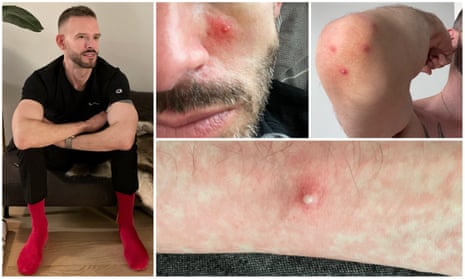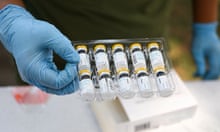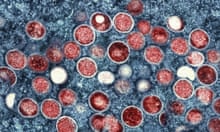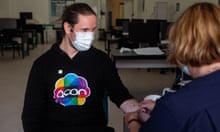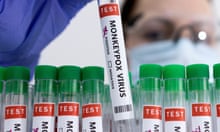I got monkeypox and it’s been a total nightmare.
When New York Pride festivities kicked off on 24 June, I was aware that monkeypox was an emerging issue – especially for gay men – but I was also under the impression that the number of cases in the city was relatively small. What I didn’t understand was how absolutely dismal testing capacity was: at that point, the city only had capacity to process ten tests a day.
I had sex with several guys over the weekend. Then a week later, on 1 July, I started feeling very fatigued. I had a high fever with chills and muscle aches, and my lymph nodes were so swollen they were protruding two inches out of my throat.
First, I took a Covid self-test: negative. Then I started suspecting monkeypox. I texted a friend: I’m just sitting here waiting for the rash to start.
I’m a 39-year-old man from Sweden, living in Brooklyn and working in philanthropy. For the past decade, my work has primarily focused on sexual and reproductive health and rights, so I followed the outbreak from the very beginning. I had even tried to get vaccinated when New York City launched an initial vaccination drive on 23 June. But like the vast majority of other New Yorkers who tried to get an appointment, I had no luck.
Two days after my symptoms began, the rash started as anorectal lesions – painful sores on my anus and rectum. Initially it was a stinging, itchy feeling. I wasn’t scared at this point. I was told that it would be mild, and I was a completely healthy individual with no underlying conditions. But I had no idea how bad it was going to get.
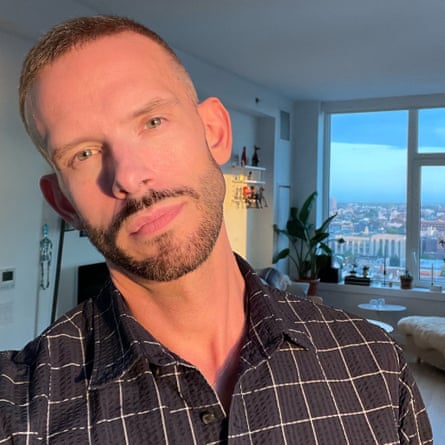
I had a tele-health visit with my primary-care physician (PCP) and she agreed that I should get tested. So I went to urgent care. I had all the symptoms of monkeypox and thankfully nobody questioned whether or not I should receive a test. I also asked for a full STI panel.
I wanted the antiviral drug that is being used to treat monkeypox, TPOXX, but you need a positive test result first. So they sent me home with Tylenol. (European regulators have approved TPOXX as an effective monkeypox treatment, but the FDA has only approved it to treat smallpox. The CDC maintains a stockpile of TPOXX and allows for its “compassionate use” during monkeypox outbreaks.)
After I went home, the rash started spreading, and I began to feel anxious. I developed lesions literally everywhere; they started out looking like mosquito bites before developing into pimply blisters that would eventually pop, then finally scab before leaving a scar. I had them on my skull, on my face, my arms, my legs, my feet, my hands, my torso, my back, and five just on my right elbow. At the peak, I had over 50 lesions, a fever of 103F and intense pain, prompting a panic attack. Ironically, the only place I didn’t have lesions was my penis.
The next day I got my STI results: positive for gonorrhoea. But no word yet on monkeypox. That’s when I developed hives everywhere on my body from my neck down, as well as a headache, arthritis pain in my fingers and shoulders and a strange pain in my shin bone that got so painful that I couldn’t stand up. At night, I would wake up going crazy with both pain and itching from the lesions and hives, just sitting up in bed and scratching myself. I was isolated, lonely and frustrated with how unfair the situation was. I was clearly very sick, yet had to cobble together a care plan on my own.
My anorectal lesions, which were already very painful, turned into open wounds. It felt like I had three fissures right next to each other, and it was absolutely excruciating. I would literally scream out loud when I went to the bathroom. Even keeping the area clean, like washing myself, was extremely painful. It was a two hour process each time.
Four days after my test – I got a call from urgent care that I had tested positive for monkeypox. But they gave me no information beyond that. So I started calling around to see how I could get access to the antivirals. I knew the CDC had put out guidance around who should be considered for treatment, and that included people who had anorectal lesions, lesions in the throat and dermatological conditions, which I did.
But I was just referred in circles. I would call urgent care, who told me to contact the department of health. The department of health would say, “Oh no, your PCP has to request treatment for you.” Then I would contact my PCP, and they were like, “We can bring the case to the department of health, but just so you know, they deny most of our requests, so don’t get your hopes up.”

Then my throat started swelling up. My tonsils were covered in white pus. I did a video with someone in my PCP’s office and they said, “I think you should go to the ER.” The ER determined it was bacterial tonsillitis, and they gave me a round of antibiotics. But when I asked them for antivirals, they said they wouldn’t give them to me because they only gave it to people who were severely immunocompromised. I told them, “That’s not the CDC treatment guidelines.” They wouldn’t have it, and they discharged me at 2 am. I was incredibly demoralized.
The next evening, I finally got a call from a clinic at Columbia University’s Irving Medical Center. They said DoH had asked them to take on my case. So that was apparently how I was one of the lucky few to be invited for treatment. Because the drug hasn’t been extensively tested in humans, there’s quite a significant informed consent and intake process. I spent about an hour at the clinic and walked out with a two week supply of TPOXX. I was so relieved.
You have to take three pills every 12 hours, with a high fat diet. I’m eating a lot of bacon and whipped cream, which is the second best thing about this treatment. The lesions started drying out very quickly and I’m now down to just three tiny little scabs left. Only in the last couple of days have I been able to go to the bathroom without pain.
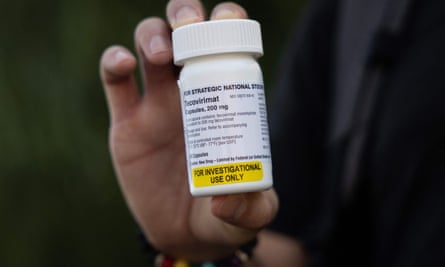
I’m still in isolation. I can’t tell you how sick of my apartment I am right now. I’m a pretty privileged person in that I have the resources necessary to order food and medicine and get it delivered to my door. I have laundry in my apartment, so I can wash my bedsheets and clothes. I know other people who are really struggling with isolation because they don’t have the situation I have.
The day after I started the treatment, 13 July, I finally got a call from a contact tracer from the department of health, who said I may have been exposed to monkeypox on 26 June. I told her I already have monkeypox, and she asked me about my symptoms. The call lasted about half an hour and she was obviously reading off a script. Then she was like, “Okay, thanks for your time, get well,” and hung up. She didn’t even ask me what contacts I’d had.
This whole thing just feels like a huge failure that should not have been allowed to happen, especially not two and half months into the outbreak. If someone like me, who has worked in sexual health for a long time, had such a hard time navigating care, I can’t imagine other people doing it. I know several people who are just sitting at home in agonizing pain because they’re not getting the support that they need.
I’m pretty worried that we’re close to the point that this is going to be another endemic disease, especially among gay men, if we haven’t passed that point already. I’m worried we’ll be stuck with it forever.
